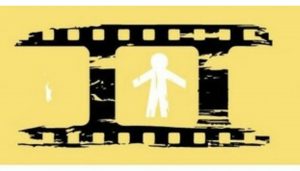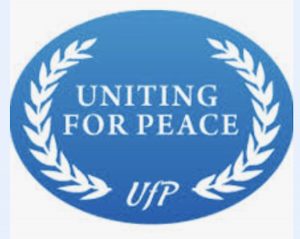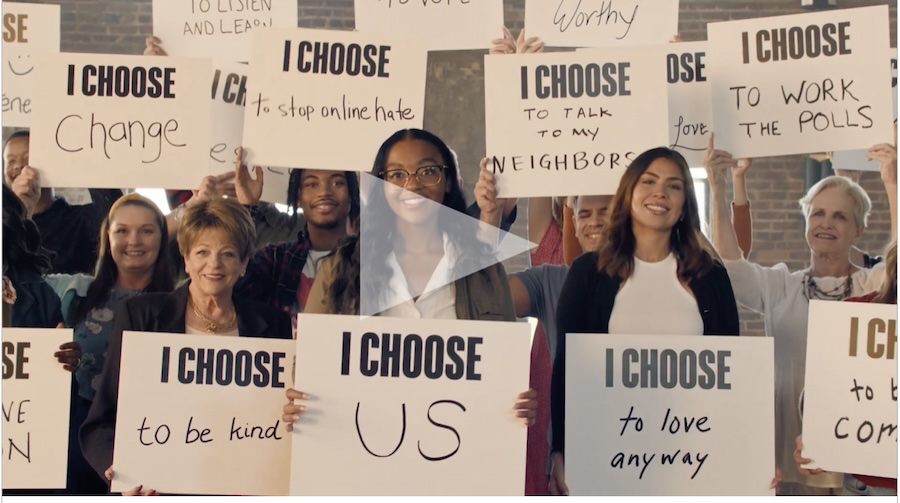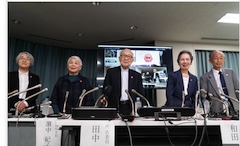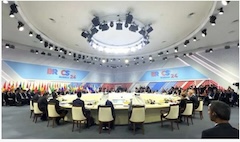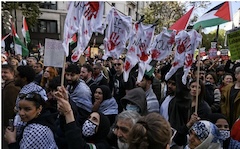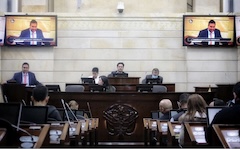… EDUCATION FOR PEACE …
An article by Sarah Stenovec from Mediators Beyond Borders
Dr. Stephanie Myers, a distinguished leader and passionate advocate for change, has dedicated her life to community activism, nonviolence, and providing opportunities for young people. Born and raised in Los Angeles, California, Dr. Myers earned her undergraduate degree in psychology from California State University, Dominguez Hills and went on to earn her graduate degree through the Coro Foundation in collaboration with Occidental College. In a nutshell, Dr. Myers held a presidential appointment for twelve years across the Department of Health and Human Services and the Office of Commercial Space Transportation.
She went on to become the national chair of Black Women for Positive Change (which was initially Black Women for Obama in its founding year, 2008). She served as Co-Chair of Black Women for the Biden/Harris campaign in 2020, and is currently producing Non Partisan memes to encourage GenZs to vote in the critical 2024 election. And, of course Dr. Myers is personally supporting our historic Vice President Kamala Harris, for President of the USA.
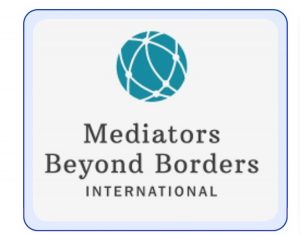
Along the way, Dr. Myers and her husband co-founded a publishing company, R.J. Myers Publishing & Consulting Co. Passionate about history and recognizing underrepresented voices of the past, Dr. Myers wrote and published her very own book in 2017, Invisible Queen: Mixed Race Ancestry Revealed, on the history of Queen Charlotte and her neglected story (available for purchase at www.myerspublishing.com). In 2006, Dr. Myers felt drawn to return to school and earned her doctorate degree in Applied Management and Decision Sciences from Walden University. Today, Dr. Myers’s primary work rests in her commitment to Black Women for Positive Change, where she remains unremittingly dedicated to nonviolence initiatives both in her local community and abroad.
Founding Black Women for Positive Change (BWFPC) & The Nonviolence Initiative
Black Women for Positive Change initially began as Black Women for Obama, a loyal group supporting President Obama’s campaign in 2008. After Obama’s reelection in 2012, the group decided to stay together and rebranded to become their current organization. Originally focused on creating pathways for young individuals in the Washington DC area, the organization shifted its focus to nonviolence initiatives following the tragic killing of Trayvon Martin. Dr. Myers and her team felt struck with an unimaginable reality––nobody should have to fear death in their daily lives, on a trip to the convenience store. Recognizing the urgency of this issue, the BWFPC team launched a non-violence initiative that has continued to evolve and strengthen over the past thirteen years, growing from a single day of awareness to an entire month of advocacy in 2021.
Today, their initiative includes participants from six African nations, as well as the United Kingdom, South Korea, and various organizations across the United States. Such growth has been met with both challenges and achievements, and Dr. Myers recognizes MBBI as being a key strategic partner in collaborating with these overseas participants and supporting their continually expanding global network. Dr. Myers was originally introduced to MBBI through the National Association for Community Mediation, whose members work within local courts in their communities as legal mediators, and with whom MBBI partners regularly.
BWFPC is not only focused on supporting black women; it is also multi-cultural, interfaith, intergenerational, and includes men who are active members, known as “Good Brothers.” BWFPC is working to demonstrate how being inclusive to all can lead towards positive change. Dr. Myers herself is a mother, grandmother, and great-grandmother, balancing family life with her leadership role in BWFPC as well as her publishing company. Despite her busy schedule, she remains steadfast in bringing people together. She believes deeply in the importance of inclusivity and collaboration:
“Inclusivity and working together, those are the themes that we simply have to get across to people. It’s just so sad, that even today in 2024, we have people who don’t understand the interconnectedness we all share. And we’ve got to emphasize that… We have to get past this silo mentality that everyone has, and we have to come together,” she emphasizes.
Changing Our Culture of Violence
A key idea in Dr. Myers’s philosophy and motivation is “changing our culture of violence” in America. Rooted in Dr. Myers’s complex understanding of American history, this driving force in her advocacy work recognizes centuries of violent frameworks engrained in our nation’s culture. “America was born into violence, we know that through the genocide of Native Americans, through the slavery of Black Americans, and through the white indentured servants… who, despite being freed from servitude, still had to struggle. So, they were subject to violence as well. Thus, we have had a culture of violence.” This history, Dr. Myers argues, exists systemically and has permeated the modern boundaries of social and racial activity and dynamics in society.
“Change has to happen. The hatred, the racism, the anger, the confrontation, our American system is built on laws, which are very important, but intrinsic to our legal system is confrontation. ‘You’re right, I’m wrong’. A lot of the violence starts right at the kitchen table at home.”
Much of her work focuses on returning to the underlying causes of youth violence, which are often associated with frustrations within the home. Dr. Myers aims to help students work through these frustrations and address them with peaceful strategies of mediation and de-escalation, while simultaneously providing an emotional outlet that allows individuals to comfortably express their feelings.
Multimedia and Film as a Tool for Change
BWFPC embraces a multimedia approach to their work as a tool for change. Dr. Myers recently produced two short films, both of which are available on the BWFPC website. One of the films, “On Second Thought”, is based on a true story of confrontation and reimagines the scenario with a focus on examining the impact of escalation versus peaceful resolution. Dr. Myers recognizes the power of using media to disseminate the messages of violence prevention and to promote alternatives to violence, while also emphasizing the urgency with which these topics should be handled.
The Role of Mediation in Community Work
Though Dr. Myers doesn’t necessarily think of herself as a mediator, she manages the coordinating of BWFPC’s activities and programs with a strategic approach. Recently, Dr. Myers shared, BWFPC organized an impactful event where sixteen high school students visited the White House’s Executive Office Building to have a discussion with Greg Jackson, the Deputy Director of the Office of Gun Violence Prevention. The students shared personal stories of violence that they had witnessed or experienced, guided by two skilled peace circle facilitators who encouraged and supported the students to express themselves emotionally in what Dr. Myers calls a “restorative justice peace circle.”
(Article continued in right column)
Mediation as a tool for nonviolence and culture of peace
(Article continued from left column)
“Now it may not have been that they were the direct victim, but it was stories like seeing their fathers robbed or like seeing their mother under attack at a store, having a cousin beaten up. The fact that our young people have to go through this is just very distressing. So that’s what mediation means to me. To be able to try to expose the reality to people who are policy makers and help them realize we must find ways to change this kind of behavior.”
The prevalence of violent experiences among young people was a deeply distressing realization for Dr. Myers and her team, reinforcing the glaring importance of implementing peaceful pathways for young individuals. Her work aims not only to bring awareness to the harsh realities of youth violence but also to implement changes that will combat systemic injustice and build foundations for sustainable development.
Goals for Future: Peace Circles and Opportunities as Alternatives
One of Dr. Myers’s main advocacies is the implementation of facilitated peace circles inside of schools, which BWFPC is seeking funding to launch. “It would be so wonderful for mediators and other professionals like facilitators to be paid to go into the school and to be able to work with the kids,” she explains. “The young people often don’t get a chance to express their grievances until their anger escalates and they get into a fight and get suspended, and one thing leads to another.”
One very important revelation for Dr. Myers was that these children are not gaining exposure to potential future opportunities, both professional and personal, that recognize their potential and allow them to recognize their own capabilities to succeed. She envisions introducing young individuals to professional opportunities that showcase their potential, an idea she has termed “Opportunities as Alternatives.” This initiative could include, eventually, a Positive Change Academy that would expose students to fields like AI, cybersecurity, and other industries they may not otherwise consider.
“I’d like to see the field of mediation expanded because most people don’t even know that it exists. And most people are not aware of the impact that this profession has. I got my undergraduate degree in psychology, but I had no idea that mediation was a dimension of behavioral science. It needs to have more emphasis. Through peace circles and through more exposure, I think mediation needs to advertise itself more as a career so that people can learn about the opportunities and also to demonstrate how it works.”
Path to Becoming a Presidential Appointee
In reflecting on her path to becoming a presidential appointee, Dr. Stephanie Myers illustrates the power of seizing moments and building connections based on her own personal experiences. As a graduate student, she would escort students to Sacramento, California to interview various legislators––one happened to be Governor Ronald Reagan. She later attended a meeting where Reagan shared a story about his first broadcasting job, explaining how he was hired on the spot for confidently improvising when the red light went on. In a moment of inspiration, Dr. Myers chimed in, “The moral of this story is to know what to do when the red light comes on!” The comment struck a chord with Reagan, sparking a connection that would grow over the years. Dr. Myers continued to engage him, writing letters to advocate for Black communities and challenging his policies—correspondence he acknowledged by responding thoughtfully. Dr. Myers’s father, Robert W. Lee Sr., encouraged her throughout this process, reminding her that, “Access is power. If you are close to someone who’s a decision maker, you can make a difference.”
Years later, when Reagan became president, he recognized her commitment and insight, leading to his office reaching out to her with an invitation to come work in Washington and recognizing her honorable work within the Black community. Accepting this role, she headed the Minority Business Development transition team, where she courageously defended the program from cuts, successfully advocating to expand it—a legacy that endures today. She also helped create the Office of Minority Health at the US Department of Health and Human Services, and was the top official in charge of the “Just Say No” campaign against drugs.
For Dr. Myers, young people have a unique power to influence change by connecting with experienced leaders. She encourages letter writing as a meaningful and often overlooked way to build intergenerational relationships, bridging perspectives and fostering solutions. “Being involved, having the determination, writing letters to people, however you can reach them, especially when you’re young. Older people don’t really get a chance to interact with young people that much. It provides an opportunity… as an alternative to violence, and allows people to see that there’s another world out there.” Dr. Myers’s unwavering commitment to fostering community, encouraging inclusivity, and promoting opportunities as alternatives to violence embodies her lifelong mission of positive change.
Advice for New Mediators
When asked to share advice or recommendations for new mediators starting out in the field, Dr. Myers emphasizes the importance of self-reflection, compassion, and fostering unity and peace. She would advise a new mediator to “look at their own life first, and make a list of maybe the ten primary relationships they have… look and see how those relationships are working. It would start with self-examination. As they go through the mediation process, they should not be a hypocrite who tells others how to fix their lives when, in fact, their own lives are still out of kilter.”
Dr. Myers speaks to the current political climate in America and the broader need for mediation in society: “Right now, we have a nation that is really struggling with values and attitudes. There’s a lot of anger out there… so we’re all seeing now that there’s a lot of division, and we have to find a way to heal that and bring people together.”
An important element of social interaction Dr. Myers highlights is the tolerance for, respect of, and acceptance of differing perspectives: “We have to find ways to let people know that I will respect your right to disagree with me, that’s okay, but you need to disagree in some way other than turning towards violence.” Again, Dr. Myers emphasizes changing our nation’s culture of violence. Mediation embodies the potential for a culture of peace, according to Dr. Myers, and we can forge this path by recognizing our responsibilities as active citizens.
“All of us are responsible to change the culture of violence. If there’s any message, it’s that we must change that culture through mediation, through love, through faith, through relationships, and we each must find out how best to do this.” Furthermore, this sense of responsibility goes beyond the individual to become a shared responsibility across all sectors of society. “We want our law enforcement officers, our faith leaders, our corporate leaders, and our political leaders to come together and realize we have to find ways to disagree that are peaceful and positive.”
For Dr. Stephanie Myers, mediation is not merely just a profession, but rather a calling to promote understanding and respect in communities to recognize the destruction of violence and to weave the fabric of a culture of peace.
– – – – – –
If you wish to make a comment on this article, you may write to coordinator@cpnn-world.org with the title “Comment on (name of article)” and we will put your comment on line. Because of the flood of spam, we have discontinued the direct application of comments.


